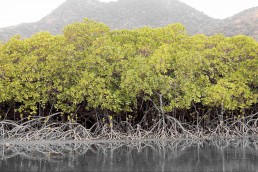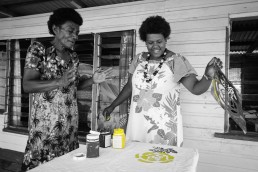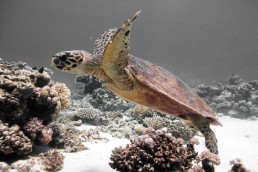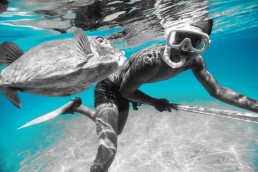Blue Carbon
Blue Carbon
Seagrass and Mangrove Research and Conservation
The importance of mangroves and seagrass ecosystems.
In the past, conservation efforts placed heavy emphasis on coral reef ecosystems. It is only recently that the fundamental significance of mangrove forests, tidal wetlands, and seagrass beds has been recognized as blue carbon sinks. Science has discovered that these underappreciated ecosystems can store more carbon for a longer period (up to thousands of years), and at a far quicker rate than terrestrial forests.
C3 has long been involved in seagrass and mangrove research and conservation. We regularly contribute to national and global knowledge about these critical systems. A large part of the organisation’s work involves mapping these ecosystems, documenting threats, and establishing community monitoring programmes as well as campaigning for their inclusion in new and existing MPAs.
We work with the following agencies and organizations:
- European Union
- US Embassy
- US Forestry Service
- IUCN
- FLMMA
- Canada Fund for Local Initiatives
- Australian Aid
- Ministry of Agriculture
- WWF South Pacific
In the areas we work, these ecosystems are critical.
Mangrove and seagrasses sustain coastal livelihoods, and provide nursery grounds, feeding areas, and shelter for hundreds of fish and invertebrate species.
Furthermore, these blue carbon ecosystems provide physical protection for vulnerable coastal communities from increasingly frequent and severe typhoons that result from the escalating impact of climate change.
Throughout Macuata, C3 is assisting communities in establishing native forest nurseries and replanting denuded forests. It also assists in replanting mangroves and establishing MPAs focused on mangrove and seagrass ecosystems. With our hundreds of community volunteers and 800 Reef Rangers, we have a huge capacity for replanting large swathes of coastal and upland forests at low cost.
C3 is currently working with the European Union to extend mangrove forests in Macuata and Cacuadrove. From 3,200 mangrove trees planted in 2019, we aim to raise the number to 5,000 by 2022, and eventually to 6,200 by 2023. This will result in an increase of hectares of mangrove forest under community protection: from 10.5 ha in 2018 to 30 ha in 2023. These targets will be reached through the integration of key mangrove habitats in LMMAs, and community involvement in training, replanting, and weekly monitoring of propagule success at target sites.
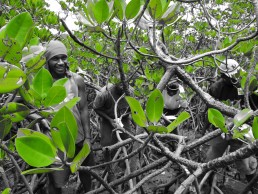
Related Case Studies
Contact
C3 Fiji
108 Nasekula Road, Labasa
C3 Fiji (Community Centred Conservation (Fiji) Limited), in accordance with the Companies Act, is registered as a non-profit organization in Fiji under the Registrar of Companies with Company Registration No. RCBS2014G3314.
Rural Entrepreneurs
Rural Entrepreneurs
Promoting Local Livelihoods
Tailor-made training for communities.
In order to conserve coastal resources for the long term, the buy-in and motivation of local people is fundamental. C3’s focus on rural entrepreneurs addresses this challenge.
C3 has conducted business feasibility studies in conjunction with household surveys and focus group interviews to determine the best livelihoods for specific communities. Livelihoods take time to develop, especially in rural communities with a local level of education and financial literacy. We find that set-up, intensive monitoring, and ongoing support are required for a three-year term. This ensures that businesses are financially viable and sustainable.
C3 focuses heavily on the engagement and training of women, unemployed youth, and minority groups such as the LGBT community to provide employment opportunities close to home. This counteracts the constant emigration from rural communities to urban centres and prevents the associated ‘brain drain.’
Our partners include:
It is a well-known fact that most small businesses fail in the first two years. To overcome this, C3’s approach focuses on year-on-year technical and financial support, refresher training, monitoring, and advising for people starting new livelihoods.
In most of our partner communities, people are limited to fishing and farming, and often it is for subsistence purposes. Diversification of household income increases communities’ resilience to the impacts of climate change on dwindling fisheries. It also helps them provide for their families in times of environmental and economic shocks.
In just the past two years, C3 has established fifteen new rural enterprises, with at least fifty percent managed by women, and with a strong emphasis on unemployed youth. These businesses are financially viable.
In particular, the organic honey business is yielding substantial gains for the communities on a regular basis. Our next step is to assist our rural entrepreneurs in establishing a cooperative, developing professional packaging, and growing marketing. In this way, we shall secure a growing list of regular buyers, including exclusive resorts and restaurants.
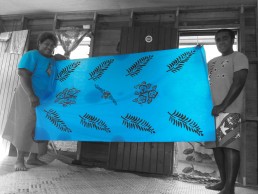
Related Case Studies
Contact
C3 Fiji108 Nasekula Road, Labasa
C3 Fiji (Community Centred Conservation (Fiji) Limited), in accordance with the Companies Act, is registered as a non-profit organization in Fiji under the Registrar of Companies with Company Registration No. RCBS2014G3314.
Endangered Species
Endangered Species
Our Ridge-to-Reef Approach to Restoration
Monitoring the return of sea turtles to Kia island.
The iconic yet increasingly rare Humphead or Napoleon Wrasse (Chelinus undulatus) and green and Hawksbill sea turtles—all endangered species in Fiji—are key flagship species for C3’s conservation campaigns. Both sea turtles, in particular, face overexploitation by communities: the former for the international fish trade, and the latter for traditional festivities.
C3 has engaged communities in outreach and monitoring programmes. As a result, we have successfully worked with traditional leaders to support the ten-year moratorium on sea turtle hunting, and to create a ban on the collection of the Humphead Wrasse. We continue to protect sea turtle nesting beaches and monitor Wrasse populations.
In 2017, sea turtles returned to Kia island for the first time in decades, laying their eggs under the protective eye of the community. These kinds of conservation successes deeply inspire our staff and communities. Moreover, with the right financial support, they can be upscaled and applied throughout the province, having immediate and sustained impact on endangered species populations.
Previous efforts by other non-profits for the community members include briefings on endangered species monitoring as well as cursory training as Fish Wardens. C3’s work on the ground, however, has revealed that despite publicity to the contrary, there are no such current activities due to lack of equipment, transport, and follow-up support. In some cases, endangered species were even incorrectly tagged, which led to maiming and potential death. While shocking, it reiterates the need for NGOs to take the necessary time and effort to work with communities on-site and long-term. Simply sending in teams for brief training and with no further contact can do more harm than good.
We work with the following agencies and organizations:
- European Union
- US Embassy
- US Forestry Service
- Ford Motor Company
- Mohamed Bin Zayed Endangered Species Fund
- Ministry of Environment
- Ministry of Fisheries
- WWF South Pacific
- Macuata Provincial council
C3 gathers traditional ecological knowledge about fish and flagship marine species and integrates this into outreach and conservation campaigns. Furthermore, we use the Ridge to Reef approach to support the many endemic species on the islands. We achieve this through habitat restoration and enhancement, and population monitoring.
We have focused our restoration efforts on the Vunivia Catchment Area, which forms part of the largest intact watershed on Vanua Levu; this, in turn, connects with the high-value Cakua Levu reefs. The flora here is part of Fiji’s last major system of mesic forest, consisting of a mosaic of vegetation types: mesic sclerophyll forest, transition forest, stunted Dacrydium nidulum forest, mangrove forest, montane forest, brackish and freshwater wetlands, and disturbed landscapes. Once labeled wholly as “dry forest”, we have seen that it is much more diverse than previously indicated. The flora comprises more than 268 native species, several of which are rare or narrowly distributed.
C3 works with traditional landowners to restore and extend these ecosystems. High-impact logging threatens the water quality and fisheries habitats in this region; therefore, urgent action is needed. Communities need to protect their remaining forests if biodiversity and local livelihoods are to be sustained.
To further reduce the impact of local communities on coastal and upland forests, C3 has equipped 300 households across Macuata with the skills to assemble and use fuel-efficient stoves. With the training of women per village, pre- and post-training collection of baseline data, and monthly advising of trainees, this number is expected to increase to 400 in 2022.
We have also helped establish native tree nurseries and replanting programmes. C3’s current partnership with the European Union and the Ministry of Forestry will amplify our efforts to maintain native forest reserves. Our goals include increasing the replanted forest area from 4.5 ha in 2015, to 14.5 ha in 2023. Appropriate saplings are chosen for this purpose.
Community protection for the forests will similarly increase from 4.5 ha in 2019, to 15 ha in 2022. A team of twenty community rangers, at least half of which are women, will also be trained by 2022. Signage and infrastructure installation will accompany the declaration of forest reserves and the reforestation of key degraded sites.
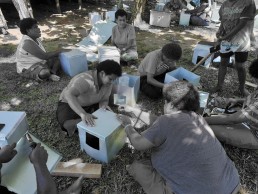
Related Case Studies
Contact
C3 Fiji108 Nasekula Road, Labasa
C3 Fiji (Community Centred Conservation (Fiji) Limited), in accordance with the Companies Act, is registered as a non-profit organization in Fiji under the Registrar of Companies with Company Registration No. RCBS2014G3314.
Marine Protected Areas
Marine Protected Areas
Sustainable Marine Protected Area Management
The only NGO working on-site in Macuata.
The coast of Macuata is bordered by Fiji’s incredible 150 km Great Sea Reef (GSR), known to be the third largest consistent barrier reef in the world. It is a hotspot of marine biodiversity and provides for a significant proportion of Fiji’s fish. It is also renowned as home to the best fishers in the nation. Over time, however, it has been exposed to increasing fishing pressures from residents and outsiders of Macuata, as well as agricultural runoff and sedimentation from the loss of upland and coastal forests.
C3 is the only NGO working on-site with traditional leaders and communities to protect the Great Sea Reef within the Macuata Qoli Qoli, or traditional fishing grounds. Although big international non-profits were previously involved in the establishment of these tabu areas, they have no physical presence on the ground to ensure sustainable local management. This is the critical role fulfilled by C3 as a permanent technical partner for the communities, with its office strategically placed in Labasa town.
By the end of 2020, the Fiji Government commits to establishing an EEZ-wide network of Marine Managed and Protected Areas representing thirty percent of the marine environment—an ambitious and important target. C3 works to contribute to this goal, while relaying concerns about long-term sustainability of marine protected area management. We are aware that so many MPAs are mere ‘paper parks’ with no positive impacts on local fisheries management, habitat replenishment and conservation, and community engagement in monitoring and management. C3 seeks to create and support this impact in working with Marine Protected Areas in Fiji.
Our award-winning documentary, produced in conjunction with Scripps, shows the challenges facing our communities. Watch it here.
A holistic stewardship model.
C3’s innovative and successful environmental stewardship model focuses on assessing the current functioning of MPAs in a holistic manner: traditional knowledge and tabus, governance, socio-economic and biodiversity assessments, and financial sustainability. Based on this data, we develop community capacity for governance and implementation of management plans.
Ours is the only programme that ensures delivery of key community services such as diversified income generation, improvements in health (e.g. WASH programme), and education services. These essentials ensure that MPAs benefit local populations and reduce unsustainable practices such as fish drives, which communities use when they are in need of cash.
Indeed, C3 assists with the provision of additional water storage facilities on Kia Island, as islanders suffer from droughts that have become increasingly prolonged and intense. Our WASH programme makes villagers aware of the role of correct water conservation, handling, and hygiene to prevent water-borne diseases. Our additional collaboration with the Red Cross highlights awareness about tuberculosis and minimizing its risks in remote communities throughout Macuata.
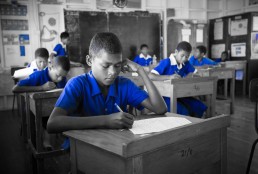
We work with the following agencies and organizations:
- European Union
- US Embassy
- US Forestry Service
- Red Cross
- Ministry of Environment
- Ministry of Fisheries
- Ministry of Agriculture
- Fiji’s Local Marine Management Areas (LMMA) network
- Wildlife Conservation Society
- WWF South Pacific
- Macuata Provincial council
C3 has supported Kia’s MPA for the past nine years.
Sustained, intensive community outreach regarding fisheries regulations, climate change, species, and habitats is a key focal area. Only by fully understanding the purpose and objectives of MPAs can the community be motivated and mobilised to protect them.
C3 helped establish the Qaranvai mangrove MPA, and currently assists with the management of eight other Locally Managed Marine Protected Areas across Macuata province. By 2023, the number of LMMAs will grow from eight to fifteen, thanks to a partnership between C3 and the European Union.
The number of trained fish wardens will also increase from thirty in 2019 to 40 in 2022. These wardens are crucial to managing and monitoring protected areas, and monitoring control illegal fishing activities.
MPAs cannot be managed in isolation of terrestrial impacts, especially in small island developing states (SIDS). Therefore, C3 Fiji also applies a Ridge to Reef approach, working with communities upstream to replant riparian vegetation and native montane forests.
Building resilience to climate change is so essential in these communities. They are at the forefront of environmental disturbances such as widescale coral bleaching, severe coastal erosion, and increasingly frequent and devastating cyclones.
One of our key successes is reducing dependence of communities solely on fishing as a source of income. C3 has now established fifteen community enterprises across five communities.
We have also recruited and trained thirty Conservation Ambassadors, who are community volunteers in charge of training and educating others in sustainable development and environmental protection.
The immensely popular youth environmental leadership programme, the Reef Rangers, now has a cohort of more than 1,000 members across twenty schools in Macuata province. This number is expected to grow to 2,500 by 2023, with at least half of them girls. Reef Rangers educate their own communities about key conservation issues, and assist with practical activities such as beach clean-ups, seagrass monitoring, and mangrove reforestation.
By 2022, twenty-five schools in Macuata and Cacuadrove will be participating in our network. Fifty school teachers, at least half of which are women, will be trained to tackle biodiversity and climate change lessons. This is accompanied by the design of pedagogic materials, and as a result, 500 Teacher Training Toolkits will be distributed in the same year.
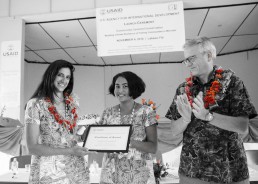
Related Case Studies
Contact
C3 Fiji108 Nasekula Road, Labasa
C3 Fiji (Community Centred Conservation (Fiji) Limited), in accordance with the Companies Act, is registered as a non-profit organization in Fiji under the Registrar of Companies with Company Registration No. RCBS2014G3314.

